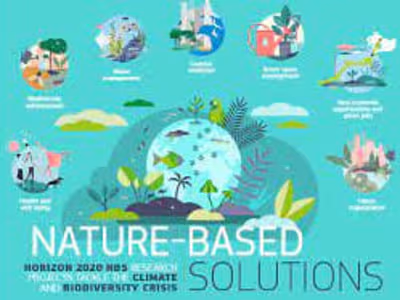Article: Nature Clubs
Nature Club: Nurturing Young Minds and Cultivating a Love for the Natural World
(An initiative of project WRAP by WWF-Pakistan)
The World Wide Fund for Nature (WWF) is an international non-governmental organization that conserves biodiversity and promotes environmentally friendly practices. With over 5 million supporters and a global network active in over 100 countries, it is one of the world's largest independent organizations. Since the late 1980s, the World Wide Fund for Nature Pakistan has worked in Gilgit-Baltistan to protect and conserve natural resources through community engagement. Gilgit-Baltistan is known for its rich biodiversity and spectacular natural beauty. WWF-Pakistan has carried out several awareness-raising and integrated conservation and development projects in the region to maintain its environmental sustainability.
Pakistan is one of the most likely countries in the world to be water stressed due to climate change, with an average per capita water availability, Although it has over 7,253 known glaciers in its northern part. . With the financial support of UKaid through the Foreign Commonwealth and Development Office (FCDO), WWF-Pakistan launched a project titled "Scaling up Nature-Based Solutions (NBS) for Improving Integrated Water Resource Management and Enhanced Water Security in Pakistan (WRAP)." The planning departments of Gilgit Baltistan and Khyber Pakhtunkhwa have overseen this project. It aims to enhance water security, improve climate resilience, and ensure sustainable livelihoods in northern Pakistan.
Under the WRAP initiative, WWF-Pakistan has introduced Nature Clubs at various educational institutions to raise awareness about the Social Developmental Goals (SDG’s) among students and the community. Nature Clubs were established in different schools so that students became aware of the evolving problem of water availability. The nature club's primary mission was to engage students in various environmentally friendly activities related to nature conservation, specifically water conservation, on a school and community level by conducting different environmental education sessions and activities that can foster an interest in young minds to protect their environment. The Nature Club gave them a platform to learn and inspired them to develop fresh and creative nature based solutions to the developing environmental crisis.
An executive committee was constituted for the formation of nature clubs in various schools and localities. All consultative meetings with line departments, documentation, school selection, approval letter issuance, and responsibilities of the schools/institutions were assigned under the supervision for the establishment of the nature clubs. Nature clubs have been set up in over 30 schools throughout Gilgit Baltistan, 18 located in Gilgit and 12 in Baltistan. School selection included both public and private schools. TheWWF appointed a focal person in each school to coordinate and maintain nature clubs. The focal's role was to plan programs and carry out environmentally friendly activities inside the school. To build an understanding of environmental issues on a grass-roots level, primary school students, such as those in 4th and 5th grades, were intended to join the club. A total of 25 participants attended the nature club in each school. The club committee endorsed maximum participation, particularly female participation. Students from diverse ethnic backgrounds enthusiastically participated in the activities.
Nature Club activities began with an orientation to introduce club members to the basic concept of the Nature Club. Then, executive body orientation elections (Chairman, General Secretary, Finance Secretary, Events Manager) were held. Members who wanted to run for candidacy delivered speeches on environmental problems, and votes were cast based on their addresses.
Several school sessions were held to introduce and discuss the significance of nature-based solutions (NBS) in environmental concerns. Group work kept participants engaged throughout the sessions, and several examples of NBS implemented in the WRAP project were discussed. To demonstrate how humans are connected with nature, an art competition, essay competition, poetry competition, quiz competition, and story writing competition was organized in each school. This activity taught participants about the importance of nature and their responsibility to protect it. Almost two exposure visits were made in each school, which included group traveling to natural ecosystems (forest, national park, wetlands) and the physical intervention sites to increase the knowledge and understanding of nature and the environment. Apart from schools, an exclusive exposure visit was organized for Fatima Jinnah Women's College, Gilgit students, in which they visited the Naltar wetland complex. At last, the nature club members were awarded a certificate of participation to encourage their enthusiasm for protecting their environment, and the focal person of each school was rewarded with a token of appreciation to appreciate their efforts to run the clubs within their schools.
Engaging in nature club activities helped shape children's behavior and mentality by fostering a deep connection with the environment, providing environmental education, promoting emotional well-being, instilling a sense of responsibility, nurturing creativity, and cultivating a sense of adventure and curiosity. These experiences laid a foundation for these children to develop a lifelong commitment to environmental protection and sustainability. Spending time in nature allowed school children to connect more deeply with the environment. Nature activities provided opportunities for learning about ecosystems and biodiversity. Through hands-on experiences like observing wildlife, exploring different habitats, or participating in nature-based projects, the students learned about environmental issues and the importance of conservation. Engaging in activities positively impacted their school environment, fostering a sense of empowerment and the desire to protect nature in these school children.Students expressed a greater appreciation for the natural world and its beauty. Nature club activities provided opportunities for self-discovery and personal reflection.
Like this project
Posted Aug 12, 2023
An article about Nature Club: Nurturing Young Minds and Cultivating a Love for the Natural World
Likes
0
Views
20



